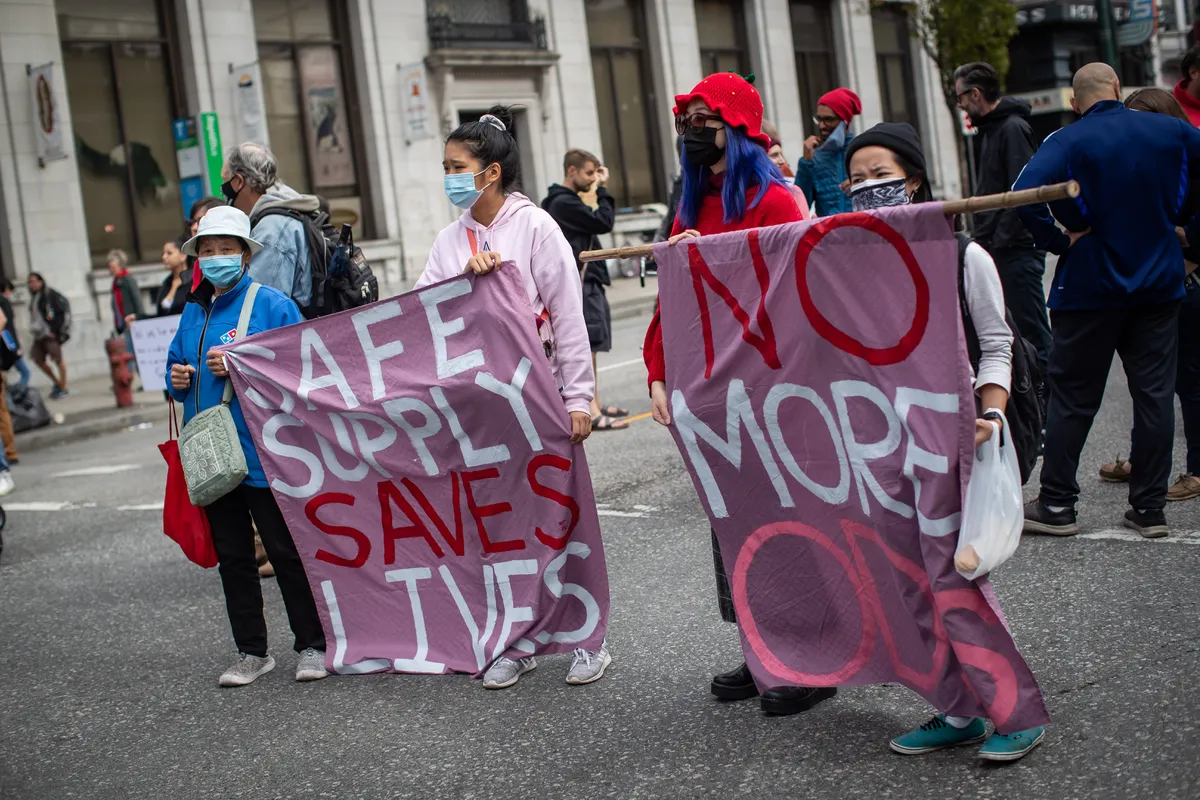Written by: ANDREA WOO, CBC News
Originally Published: MARCH 9, 2022
A panel, struck to examine the deaths of thousands of British Columbians from toxic illicit drugs, is recommending the province rapidly expand access to a safer drug supply and develop a governance framework with clear goals and targets to hold health authorities accountable.
The BC Coroners Service’s death review panel noted that while B.C. has created provincial policy to support prescribed alternatives to the illicit drug supply, a rapid expansion involving non-prescription-based models is “required with an emergent response.” Since the announcement of the provincial policy last July, there has been no meaningful expansion of such programs, which remain mostly limited to pilot projects and individual prescribers.
Panel chair Michael Egilson said medications could also be dispensed through public health and community-based harm-reduction models.
“The panel recognizes the complexity of federal-provincial jurisdictional challenges,” Mr. Egilson told a news conference on Wednesday. “Nonetheless, both levels of government have demonstrated through the COVID-19 emergency health response that it’s possible to overcome legislative, jurisdictional and resource barriers quickly in order to prioritize public health and well-being.”
An estimated 27,000 people across Canada have died from illicit drug toxicity since 2016, with the majority of deaths occurring in Ontario, B.C. and Alberta. As a result of a surge in deaths, B.C. declared a public-health emergency that year. Since then, the illicit drug supply has grown increasingly volatile, with extreme levels of fentanyl concentration and benzodiazepine adulteration; annual drug deaths have increased by 124 per cent; and more than 9,000 people in the province have died.
Chief Coroner Lisa Lapointe convened the panel in mid-December to review the facts and circumstances of more than 6,000 illicit drug toxicity deaths in B.C. from Aug. 1, 2017, to July 31, 2021, and provide advice on medical, legal, social and other matters that may help prevent similar deaths.
Its 23 members include people with expertise in public health and health services, substance use and addiction, First Nations health, oversight and regulation, and policing. It is the second such panel since B.C. declared the public-health emergency.
The panel urged the Ministry of Health and the Ministry of Mental Health and Addictions to work in collaboration with the chief executive officers of regional health authorities, the Provincial Health Services Authority and the First Nations Health Authority to develop a plan by May 9 to expand access to a safer drug supply.
By that same day, the groups should also have a 30/60/90-day action plan to develop and implement a “strategic management and governance framework that sets clear goals, targets and deliverable time frames” for reducing drug deaths, the report said. This includes identifying roles and responsibilities among provincial and regional health authorities.
The panel also recommended building a continuum of care that better integrates primary care with treatment of substance-use disorders. This includes expanding harm reduction services, health promotion and prevention planning, addiction treatment with more prescribers, psychosocial treatment interventions, recovery-oriented care and an emphasis on co-ordination across all systems and levels of care.
The federal Minister of Health, Carolyn Bennett, should approve B.C.’s application for an exemption from the Controlled Drugs and Substances Act to decriminalize personal possession of illicit substances by April 11, the panel recommended.
A statement provided by Ms. Bennett’s office said the minister would not comment on any requests currently under review. The Globe and Mail also sought interviews with B.C. Minister of Health Adrian Dix and B.C. Minister of Mental Health and Addictions, Sheila Malcolmson, but received no response.
The recommendations are non-binding, and some recommendations from the first review have not been implemented. The report urges the Ministry of Health and Ministry of Mental Health and Addictions, along with regional health authorities, to review those earlier recommendations, which the panel said are still relevant and required. Specifically, the previous panel advised the B.C. government to provincially regulate and oversee recovery programs, expand treatments such as oral and injectable opioid agonist therapies, and expand drug-checking services.
“There is much work still needed with respect to regulating, overseeing and evaluating substance-use treatment and recovery services,” Mr. Egilson said.
Meanwhile, an American Journal of Public Health study published Wednesday of British Columbia’s implementation of safe supply alternatives during the COVID-19 pandemic found that while these regulated medications reduced overdose risk, some recipients still accessed illicit drugs because of limitations in prescribing.
B.C.’s rollout of safe supply began as a risk-mitigation measure in the early days of COVID-19, allowing some people who use drugs to take home prescribed alternatives to the illicit supply so they could reduce risk of withdrawal and potential exposure to the virus, and comply with safety measures such as isolation.
But with a focus primarily on managing withdrawal, these prescriptions did not reflect the participants’ real-world use, and some participants supplemented with illicit drugs, albeit with “drastic reductions” in use and overdose-related risk, the study said.
Lead author Ryan McNeil, a research scientist at the British Columbia Centre on Substance Use and director of harm-reduction research at the Yale School of Medicine, said an effective safer supply must provide people who use drugs with regulated versions of their drug of choice, at adequate doses.
“Medicalized approaches primarily oriented toward managing withdrawal help immensely. But, they cannot fully address the needs of people who use drugs because they do not reflect how and why people use,” Dr. McNeil wrote in an e-mail to The Globe.
“We can only achieve that by shifting toward safe supply approaches that provide people with safer, regulated versions of what they actually want. Amidst a devastating crisis, there is a public health and moral imperative to act, and no level of government can continue pretending that what we’re doing is enough.”
_________________________________________________________________________________
Content taken from: https://www.theglobeandmail.com/canada/article-bc-coroner-review-opioid-deaths/


